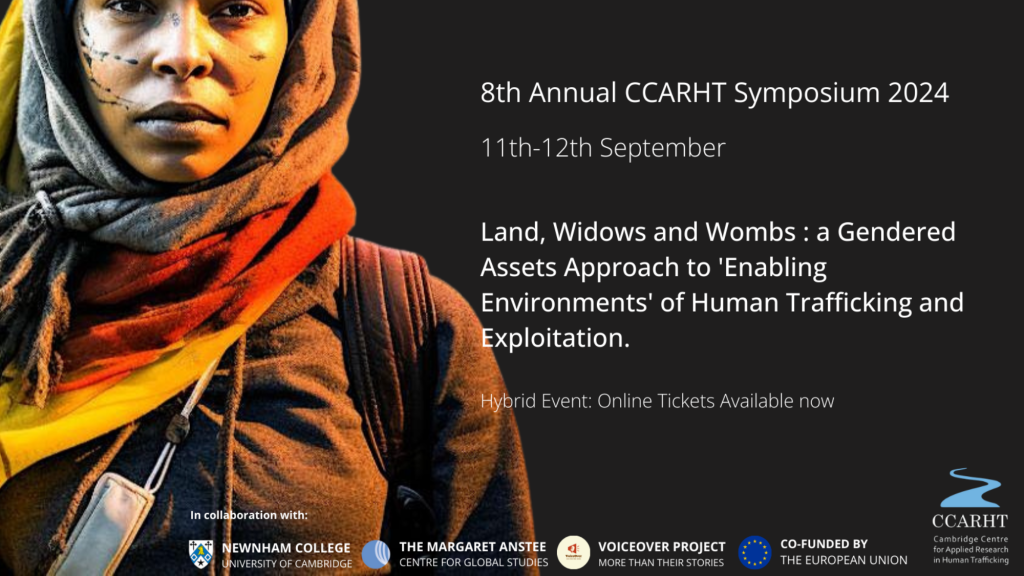The Hidden Cost of Remittances: African Women Domestic Workers in the Gulf
The 8th Annual Symposium of the Cambridge Centre for Applied Research in Human Trafficking, titled “Land, Widows and Wombs: A Gendered Assets Approach to ‘Enabling Environments’ of Human Trafficking and Exploitation,” now just a week away, will shine a light on some of the most pressing yet overlooked issues in the area of human trafficking and exploitation. Themes that are embedded in the fate of Land, Widows and Wombs.
In this blog we have asked one of our contributors on day 2, chapter 3 Wombs, Valentina Cominetti to open the door on her area of concern the situation of African women domestic workers who find themselves in exploitation in Gulf countries. Valentina is the Executive Director of the Global Justice Group. With nearly a decade of experience working with victims of international crimes, Cominetti brings an arresting perspective to the complex interplay of gender, migration, and exploitation.
Gender, Migration, and Exploitation.

Gender, Migration, and Exploitation
In many African societies, domestic care is seen as an extension of a woman’s identity, deeply rooted in traditional gender roles. This perception, coupled with limited economic opportunities at home, drives many African women to seek domestic work abroad, particularly in Gulf countries where demand is high but protections are scarce.
The Gulf: A High-Demand, High-Risk Environment
The Gulf region presents a unique case study in the outsourcing of care work. With 27.4% of the world’s migrant domestic workers, the Arab states have become a hub for this form of labour migration. However, this high demand comes with significant risks:
- The notorious Kafala system gives sponsors near-total control over foreign workers.
- Domestic workers are often excluded from labour law protections.
- The intersection of the Kafala system with male guardianship practices creates a particularly vulnerable environment for women workers.
According to the International Trade Union Confederation, more than 2.8 million of the African women who are employed in households across the Gulf region, are at risk of exploitation. A staggering number.
Case Study: Kenyan Women in the Gulf
Research by Global Justice Kenya provides sobering statistics that illustrate the scale of the problem:
- Nearly 99% of Kenyan women migrating to the Gulf faced recruitment-related abuses before departure.
- 100% of surveyed women experienced a restriction of freedom of movement.
- 53.02% suffered physical or sexual violence.
- 92.62% were threatened with violence or death.
The Human Cost
In 2023, Saudi Arabia became Kenya’s second-largest source of remittances, with over 400,000 Kenyans employed in the Gulf region. However, this economic benefit comes at a devastating human cost. Between 2020 and April 2024, at least 371 Kenyans, mostly domestic workers, lost their lives in Saudi Arabia.
The Invisible Children
A particularly harrowing aspect of this issue is the plight of children born to migrant workers in the Gulf. Global Justice Kenya has identified 104 Kenyan Women Migrant Workers and their undocumented children trapped in Saudi Arabia. These children, born from unknown fathers, are effectively stateless and denied basic rights such as medical care and education, making them extremely vulnerable to exploitation.
The Way Forward
Global Justice Kenya is taking steps to address these issues, including:
- Coordinating with Kenyan authorities to obtain legal recognition and repatriation for undocumented children born to migrant workers.
- Working towards establishing a Survivors’ Engagement Network to provide a structured platform for advocacy and support.
- Launching targeted awareness campaigns to mobilise support for systemic change and reforms.

Our symposium will explore strategies to address these complex issues, including:
- Enhancing legal protections for domestic workers in both sending and receiving countries.
- Addressing the structural vulnerabilities that drive women into high-risk migration situations.
- Developing support systems for returning workers who often face stigma and lack of opportunities at home.
- Exploring the formation of Survivors’ Engagement Networks to empower workers and influence policy.
Join us at the 8th Annual Symposium CCARHT as we explore these critical issues, bringing together experts, policymakers, and advocates to work towards meaningful solutions in the fight against human trafficking and exploitation.
A hybrid symposium so you can come and enjoy the sights, sounds and beauty of Cambridge in the Barbara Windsor Rooms of Newnham College, or join us on line either way secure your tickets for this not to be missed event here:

